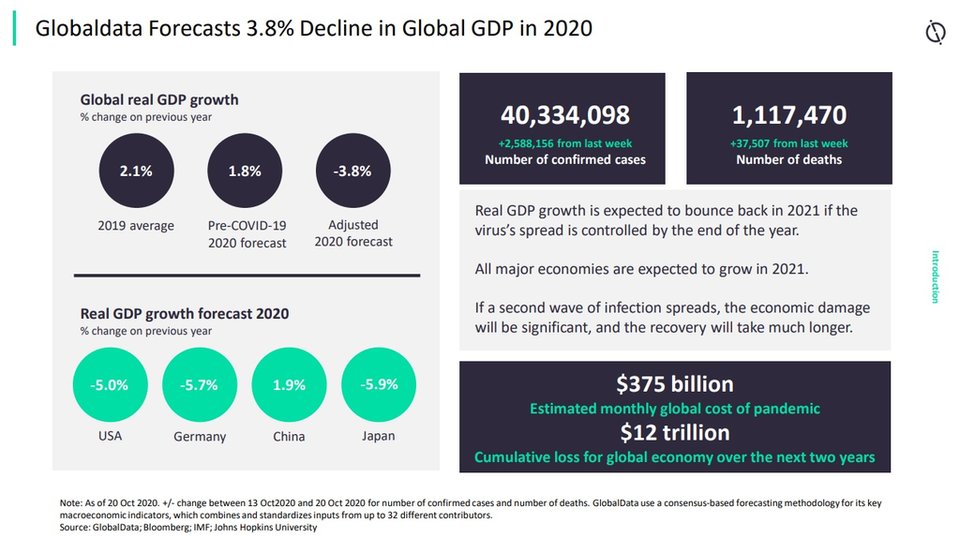Coronavirus (Covid-19) Executive Briefing
Understanding the economic impact of the Covid-19 pandemic and the implications for the travel and tourism sector
- ECONOMIC IMPACT -
After weeks of gradual decline, GDP estimates for many countries have levelled off. Consensus forecast for world GDP growth in 2020 is -3.9%.
World Trade Organization forecasts the volume of world merchandise trade to shrink by 9.2% in 2020 followed by an estimated rise of 7.2% in 2021.
-4.4%
IMF has revised its 2020 global GDP forecast to -4.4% from an estimate of -4.9% made in June.
5.3%
The global economy is estimated to contract by 4.2% in 2020 and bounce back by 5.3% in 2021.
Covid-19: Decline in Global GDP

- SECTOR IMPACT: TRAVEL & TOURISM -
As of 3 November 2020
decrease in Charter airline revenues
$16bn
In 2020, the effect of the ongoing coronavirus pandemic will result in charter airline revenues falling to $22.1bn, a year-on-year decrease of $16bn.
Revenue Bump for full-service Airlines
$1.1tn
By 2024, GlobalData figures expect the total revenue for full-service airlines to break the trillion-dollar mark, reaching $1.1tn.
Post-Covid-19 recovery
2022
GlobalData estimates that the aviation market will recover to pre-corona levels in the majority of markets by 2022, although this could change if further travel restrictions are imposed.
Key Aviation market trends
Technologies can help companies to recover
An electronic wallet, mobile ID and virtual assistant are now available to make flying with American Airlines as seamless as possible. Meanwhile, United Airlines has tested a digital health pass on a flight from London to Newark, New Jersey, as part of a programme to enable safer global travel and accelerate border re-openings.
Convincing travellers to return will be difficult
Fears around contracting the virus and the macro-economic impact of the pandemic has caused many consumers to stay at home and not undertake domestic or international trips. A major challenge for airlines will be following social distancing restrictions, whilst continuing to make a profit. Low-cost carriers rely on high load factors to be profitable.
Shifting market demands: an opportunity?
With rising concerns over climate change and increasing commitment to be carbon neutral, cleaner modes of transport will be required. This combined with the global Covid-19 pandemic means there has been a dramatic shift in market needs and wants. The airlines that react quickest to these changing demands will have an opportunity to cement themselves as market leaders within aviation.